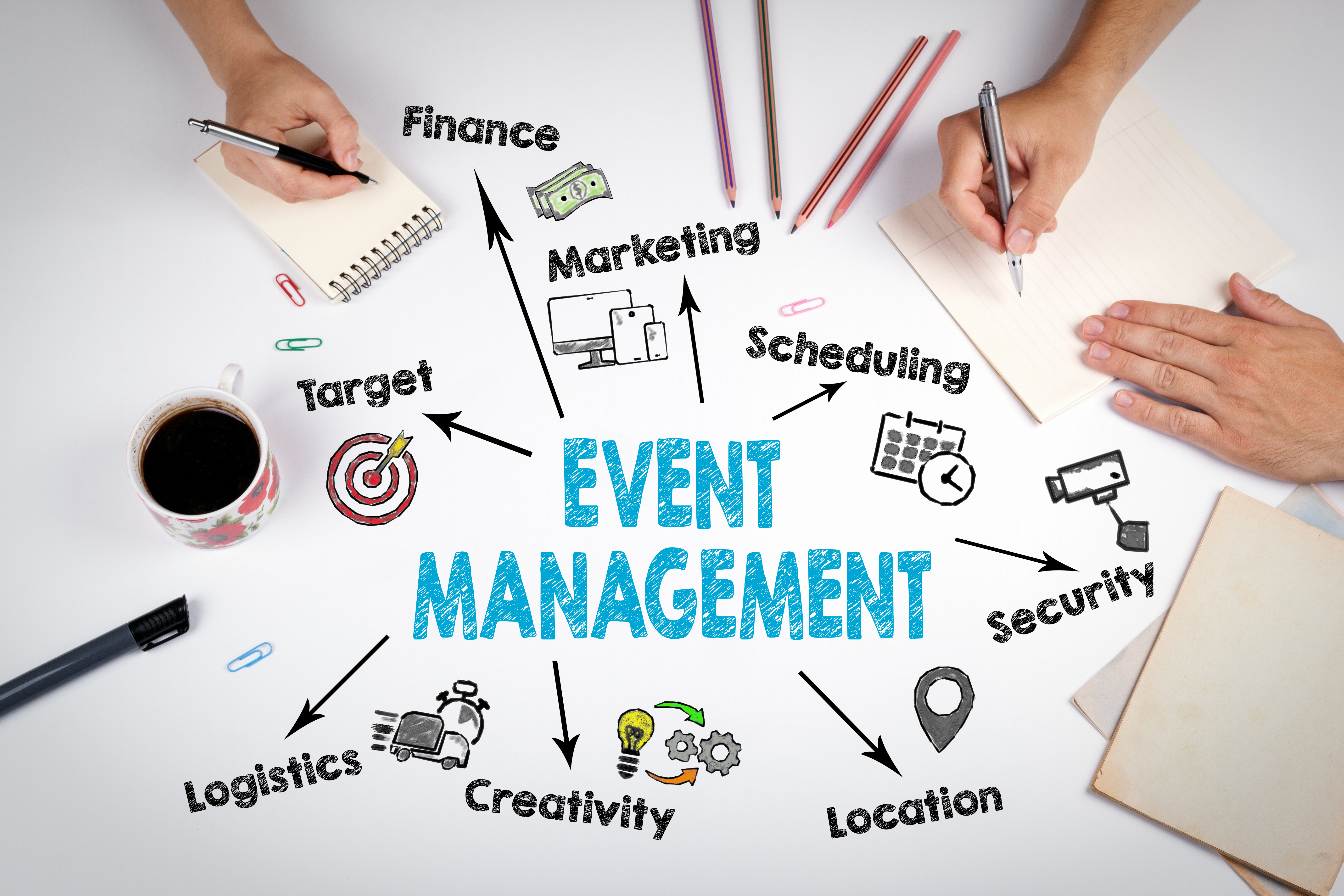Are you fascinated by the dazzle of events and dreaming of orchestrating them? Whether it's a corporate conference, a romantic wedding, or a vibrant festival, events management is a career that turns these visions into reality. But how do you navigate becoming an event planner, event manager, or even a party planner?
Let's delve into this exciting world, exploring how to get into event planning, what qualifications you need, and how to thrive in this dynamic field.
Jump to:
What is Events Management?
Events management is the art and science of creating and executing events. It involves project management, creativity, and logistical planning to ensure events run smoothly and successfully. From intimate gatherings to massive public events, an event planner's role is versatile, encompassing everything from conceptualisation to execution.
Key Roles and Responsibilities of an Event Manager

Event managers oversee the planning and execution of events. Responsibilities include:
- Budgeting: Develop and manage the event budget, ensuring all expenses are tracked and remain within the allocated funds.
- Venue Selection: Identify and select suitable venues that align with the event's theme, size, and budget requirements.
- Vendor Coordination: Coordinate with various vendors, including caterers, decorators, and audio-visual technicians, to ensure services are delivered per the event's needs.
- Timeline Management: Create detailed timelines for event planning stages and ensure all tasks are completed on schedule.
- Event Design: Work on the event design, including theme development, layout planning, and décor, to enhance the event experience.
- Logistics: Handle all logistical aspects, such as transportation, guest accommodation, and equipment rentals.
- Risk Management: Identify potential risks and develop contingency plans to address any issues that may arise during the event.
- Client Liaison: Maintain regular communication with clients to ensure their expectations are met, and any changes are communicated and addressed promptly.
- Team Leadership: Lead and manage the event team, delegating tasks effectively and ensuring all team members are aligned with the event goals.
- Post-Event Evaluation: Conduct post-event evaluations to gather feedback, assess the event's success, and identify areas for improvement in future events.
How to Become an Event Planner

Whether you're drawn to the glamour of weddings, the buzz of corporate events, or the excitement of festivals, becoming an event planner requires a strategic blend of education, experience, and personal development. Let's delve deeper into each step to guide you on your path to a successful career in events management.
Education and Qualifications: Laying the Foundation
Pursuing a degree or certificate in events management or a related discipline such as hospitality, business management, or marketing can equip you with a broad understanding of the industry. These courses typically cover critical areas, including:
- Project Management: Learn to oversee events from inception to conclusion, ensuring every detail aligns with the overall vision.
- Budgeting: Master the art of creating and sticking to budgets, an important skill for delivering successful events within financial constraints.
- Marketing: Gain insights into promoting events, attracting sponsors, and engaging target audiences effectively.
- Customer Service: Understand the importance of exceptional service, building client relationships, and exceeding their expectations.
Gain Experience: The Real-World Classroom
Practical experience is invaluable in the events industry, providing insights that cannot be learned through textbooks alone. Begin by volunteering for various events, from local charity functions to larger festivals. This hands-on experience will introduce you to the basics of event planning and execution.
Additionally, internships with event planning companies or within the events departments of larger organisations offer a structured learning environment and can often open doors to future employment opportunities. When seeking these opportunities, consider the following:
- Networking: Use platforms like LinkedIn to connect with industry professionals and seek volunteer or internship positions.
- Diversity: Aim for various experiences to understand different aspects of event planning, from logistics to vendor management.
Develop Your Skills: The Event Planner's Toolkit
The role of an event planner requires a versatile skill set, combining practical abilities with soft skills. Focus on developing the following:
- Organisational Skills: Excel manages multiple tasks and details simultaneously, ensuring nothing is overlooked.
- Attention to Detail: Cultivate the ability to notice and address even the smallest elements, which can significantly affect the event's success.
- Creativity: Harness your creativity to design unique and memorable events that stand out.
- Communication: Sharpen your communication skills for negotiating with vendors, coordinating with team members, and understanding client needs.
- Problem-Solving: Learn to anticipate potential issues and develop solutions quickly and effectively.
Build a Portfolio: Showcasing Your Successes
A well-crafted portfolio is your gateway to attracting clients or securing your dream job. It should reflect your style, skills, and the range of events you've managed. Include:
- Photos: High-quality images of events you've planned, showing before and after shots if possible.
- Descriptions: Brief overviews of each event, highlighting your role, the challenges you faced, and how you overcame them.
- Testimonials: Feedback from clients, vendors, or supervisors that attest to your skills and professionalism.
- Press Coverage: Any articles or mentions of your events in the media or online.
Continuous Learning and Professional Development
The events industry is dynamic, with trends and technologies constantly evolving. Stay ahead by:
- Attending Workshops and Conferences: Engage actively in industry workshops and conferences to stay informed about the latest trends, technologies, and best practices. These events are invaluable for networking with peers, sharing knowledge, and discovering new ideas.
- Certifications: Broaden your expertise and enhance your credentials by pursuing additional certifications. Certifications can significantly bolster your resume in digital marketing, sustainable event planning, or any other relevant area. Our Event Planning Diploma Course covers everything from the basics of planning an event to advanced techniques in running your own events business, making it an ideal choice for those looking to advance their career in event planning.
- Feedback: Constructive feedback is a powerful tool for personal and professional growth. Seek feedback from clients, peers, and mentors to identify areas for improvement. Reflect on this feedback and use it as a stepping stone for further development.
Specialising in Events Management
The events industry is rich with opportunities for specialisation, allowing event planners to focus on areas they are most passionate about. Specialising can elevate your expertise, making you a go-to professional for specific events. Here are some examples of niches you might consider:
- Corporate Events: Specialise in planning and managing business events, such as conferences, team-building retreats, product launches, and end-of-year parties.
- Weddings: Focus on creating unforgettable wedding experiences, from intimate ceremonies to lavish receptions, including destination weddings.
- Festivals: Gear your skills towards organising large-scale public events, such as music, food, and cultural festivals, managing everything from logistics to entertainment.
- Charity Events: Plan events to raise awareness and funds for causes, including galas, charity runs, and auctions.
- Sports Events: Specialise in coordinating sports competitions and related events, handling aspects like venue selection, participant coordination, and event promotion.
- Exhibitions and Trade Shows: Focus on organising events that showcase products and services across various industries, managing booth setups, visitor flow, and exhibitor relations.
- Virtual Events: With the rise of digital platforms, specialising in virtual events, webinars, and online conferences can offer a unique niche with growing demand.
- Sustainable Events: Concentrate on planning events with an eco-friendly focus, ensuring that sustainability practices are implemented throughout the planning and execution process.
Event Manager Interview Questions

If you're aiming for a role in event management, prepare for questions like:
- "Why do you want to be an event coordinator?"
Interviewers seek a genuine passion for event planning and a clear understanding of the role's demands. Share personal experiences that drew you to the field, highlight your enthusiasm for creating memorable events, and discuss how your skills align with the job's requirements.
- "What does an event planner do?"
This question tests your understanding of the role's scope. Outline the core responsibilities of an event planner, such as conceptualising events, budgeting, selecting venues, coordinating with vendors, and managing event execution. Emphasise the importance of communication, creativity, and problem-solving in ensuring event success.
- "How do you handle tight deadlines?"
Tight deadlines are a staple in event planning. Interviewers want to know how you manage pressure while maintaining quality. Discuss your time management strategies, prioritisation techniques, and how you stay calm and focused under pressure.
- "Can you describe a challenging event you planned and how you handled it?"
This question allows you to showcase your problem-solving skills and resilience. Describe a specific challenging event, the obstacles you faced, and the strategies you employed to overcome them. Highlight what you learned from the experience and how it has improved your planning approach.
- "How do you manage client expectations?"
Managing client expectations is essential in event planning. Talk about your communication skills, establishing clear goals and boundaries at the outset, and your approach to keeping clients informed and involved throughout the planning process.
- "What trends do you see shaping the events industry?"
This question assesses your industry knowledge and forward-thinking mindset. Discuss current trends, such as sustainability, virtual and hybrid events, or personalised experiences, and how you plan to incorporate them into your event planning.
- "How do you measure the success of an event?"
Success measurement is key to continuous improvement. Describe the metrics and feedback mechanisms you use, such as attendee satisfaction surveys, social media engagement, and financial benchmarks, to evaluate an event's success and learn from each experience.
Jobs in Event Management

The events industry offers various roles, from in-house positions within corporations to roles within events agencies or freelance opportunities. Each comes with different responsibilities and opportunities for growth.
How Much Do Event Managers Get Paid?
Salaries for event managers can vary widely depending on several factors, including location, experience, the size and type of company they work for, and the specific niche within the events industry they are involved in. To give you an idea:
- Entry-Level Event Managers: Those just starting in the field can expect salaries starting from around £18,000 to £25,000 per annum in the UK. This figure may vary in other regions based on the local economy and demand for event management services.
- Mid-Level Event Managers: With a few years of experience, event managers can see their salaries rise to between £25,000 and £35,000 annually. Those with a strong portfolio of successful events and solid industry connections can command higher salaries within this range.
- Senior-Level Event Managers: Professionals who have established a reputation for excellence and have significant experience, especially those in managerial or directorial positions, can earn £35,000 to £50,000 or more per year. In high-demand areas or for those specialising in lucrative event niches, salaries can exceed £60,000.
Can Anyone Be an Event Manager?
While anyone with a passion for events can pursue a career in event management, success in the field requires a specific set of skills and attributes, including excellent organisational abilities, creativity, and strong interpersonal skills.
Does Event Planning Pay Well?
Event planning can be a rewarding career financially, particularly for those who specialise and build strong client networks. Your earning potential increases as you gain experience and take on larger, more complex events.
How do You Start Your Own Events Management Business?
Starting your own events management business begins with a solid foundation in event planning and a deep understanding of the industry. Equipping yourself with the necessary skills and knowledge through courses such as our Event Management Diploma is essential.
After gaining experience and building a network of contacts, including vendors and venues, create a detailed business plan outlining your niche, target market, and financial projections. Register your business, taking care of legal requirements and insurance to protect yourself and your clients. Develop a strong brand identity and online presence to showcase your portfolio and attract clients.
Finally, focus on building strong relationships with clients and vendors, delivering exceptional events to grow your reputation and client base through word-of-mouth and referrals. Success in events management relies on planning prowess, creativity, and a business mindset, all driven by a passion for creating memorable experiences.
Recommended for you!
Best SellersKickstart Your Career in Event Management with Centre of Excellence
Enter the dynamic world of event management with our Event Management Diploma Course, meticulously designed to cover every area of the industry.
Why Choose Centre of Excellence for Your Event Management Training?
- Accessibility: We firmly believe in making education accessible to all. That's why our courses, including the Event Management Diploma Course, are priced to ensure everyone can pursue their dreams without financial barriers.
- Flexibility: Our courses are crafted with your lifestyle in mind. Learn at your own pace and easily fit your studies around your existing commitments, making it simple to achieve your educational aspirations alongside your daily responsibilities.
- Comprehensive Curriculum: Discover all areas of event management, from the foundational concepts of planning an event to the intricacies of running your own events business. Our extensive curriculum addresses the broad spectrum of knowledge and skills needed to excel in the events industry.
- Dedicated Support: Enrolling in our course means joining a supportive community. You'll benefit from personalised tutor support and connect with fellow aspiring event managers, ensuring you're supported every step of the way on your learning journey.
Special Invitation
We're excited to offer our Event Management Diploma Course for just £29, saving you over £100!













